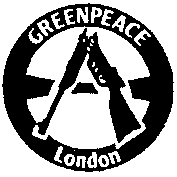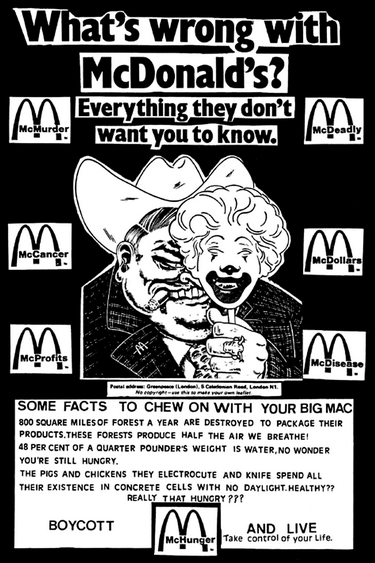The London Greenpeace (LGP) group was founded in 1971 by a group of radical environmentalists and anti-militarist activists associated with the magazine Peace News.

LGP protested militarism, nuclear weapons and nuclear power throughout the 1970s and 1980s, linking these single-issue campaigns with capitalism and challenging major multi-national corporations and state institutions. In the late 1980s, LGP became more oriented towards the animal liberation movement and gained worldwide recognition after the fast-food corporation McDonald's sued several of its members in the long-running ‘McLibel’ legal case.
The LGP group was spied upon over the period January 1977 to October 1979 by SDS undercover officer HN10 Bob Lambert (‘Bob Robinson’) and from 1987-1991 by HN5 John Dines (‘John Barker’).
After infiltrating LGP, Lambert and Dines both took an active organisational role in the group. For example, Lambert engaged in writing protest leaflets (including the controversial McDonalds factsheet) and Dines became treasurer for LGP.
Several former members of London Greenpeace are also core participants in the Inquiry, including Dave Morris, Helen Steele and Paul Gravett.
LGP were arguably the first ‘Greenpeace’ group in Europe, having been inspired by a 'Green Peace' broadsheet published in Peace News in 1971. This was a compilation of ideas about how individuals could take practical action in their own lives to preserve the ecosystem.
LGP remained autonomous from both the centralised Greenpeace International based in Vancouver, Canada and its London branch, which became known as Greenpeace UK in 1977.
In the early 70s, LGP principally protested French nuclear bomb testing in the Pacific but also turned its attention to trying to stop similar activities by Britain, the USA, the Soviet Union, China and India. In 1974, LGP helped form the Campaign Against the Arms Trade (CAAT) and held marches in London against French bomb tests and a rally at Trafalgar Square.
In 1978 the group helped found the Torness Alliance (TA) which campaigned against the building of a nuclear power station in Scotland. The TA initiated non-violent direct action (NVDA) tactics at the site. The following year, 10,000 people attended the Torness festival, with 3,000 participating in occupying the facility.
In the early 1980s, LGP was heavily involved in the burgeoning peace movement, opposing the siting of Cruise missiles in Britain and propagating the tactics of NVDA. Tens of thousands of people were involved in regular blockades of military sites, including at Greenham Common. In 1982, LGP was one of only a few groups to oppose both sides during the Falklands War.
In 1983-84, LGP initiated the ‘Stop the City’ (STC) protests, day-long street blockades involving thousands of people in the financial centres of London and other UK cities. The STC protests drew an explicit link between capitalism and war, exploitation and environmental destruction.

In 1985, LGP launched a campaign against the multinational corporations McDonald's and Unilever, partly based upon the group’s growing engagement with the animal liberation movement. In response in 1989, McDonald's launched a major spying and infiltration campaign against LGP, which led them to sue the group for libel in 1990. Dave Morris and Helen Steel contested the claim, largely without legal aid and limited professional advice.
A factsheet entitled 'What's Wrong With McDonald's?' which became central to the case, alleged that the corporation caused starvation in the Third World, destruction of rainforest, health problems, whilst using false advertising, the rearing and slaughter of animals, and unfair employment practices.
Throughout the 1990s, LGP activists and their supporters were increasingly involved in the McLibel Support Campaign. The decision in the High Court upheld some elements of the libel claim but rejected others.
In addition, many of the allegations made by the LGP activists about the corporation, including collusion between the Metropolitan police and investigators hired by McDonald's, were upheld in subsequent legal actions. The decision by McDonald's to proceed with legal action was widely regarded as a public relations blunder. In 2025, the BBC released a radio series exploring the court case, the longest in British legal history.
LGP dissolved itself in 2001, leaving an agreed statement that concluded:
Together, ordinary people can reclaim our world, currently based on the greed and power of a minority, and create an anarchist society based on strong and free communities, the sharing of precious resources and respect for all life.
Sources
Opening Statement of Dave Morris (non-state core participant) for Tranche 1, Phase 1.
Opening Statement of Dave Morris (non-state core participant) for Tranche 1, Phase 2.
London Greenpeace: A history of peace, protest and campaigning.
London Greenpeace Agreed Statement.
